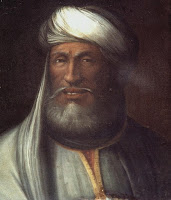Very few military leaders in history who earns the epithet "the Great" with their names and very few emerged as an undefeated military commanders.
Four Muslim Military Leaders have successfully earned this epithet "the Great" and the other Four successfully retained the undefeated streak in all of his pitched battles, while fifth Timur not only earned this epithet "the Great" but also remains unbeaten in every battle, skirmishes, and sieges. These all men were truly one of the greatest Muslim military leaders.
Umar: Umar the Great (c. 584 - c. 644), one of the greatest and most influential Caliphs in Islam and also one of the closest companion of the Islamic prophet Muhammad (صلى الله عليه و سلم) and succeeded Abu Bakr as the second Rashidun (Rightly Guided) Caliph (c. 634 - c. 644). He is famous for both his epithets i.e. Al-Farooq (the one who distinguishes between right and wrong) and "the Great". His unprecedented administrative achievements together with his influential military legacy left a lasting footprint on the Islamic world. He successfully split the Byzantine-Sassanian alliance in 636, when the king of the Eastern Byzantine Orthodox Empire, named Hercules trying to form an alliance with the Persian king Yazdegerd III against his common foe (Muslims/Saracens). Before Hercules launches his coordinated attack against Muslims, Umar ibn Khattab sent his reinforcements to the Roman front in the form of small bands one after the other, giving the impression of a perpetual flow of reinforcements that finally lured the Eastern Romans to an untimely battle (Battle of Yarmouk, 636). On the other side, Yazdegerd III involved in negotiations that further gave Umar time to transfer his troops from Syria to Iraq to fight the decisive battle against Persians in the Battle of Qadisiyyah (636). Organized and well-coordinated plans of his military actions lead towards the gradual but effective conquest of the Roman and Persian Empires in a manner of a very short time. He ruled over an empire from the Northeastern parts of Africa to the borders of India.
Ali bin Abi Talib: Ali ibn Abi Talib (c. 601 - c. 661), was the son-in-law and cousin of the messenger of Allah, Muhammad (صلى الله عليه و سلم). He was the fourth Rashidun Caliph (656-661) of Islam. Ali was an undefeated military commander and warrior, not only remained undefeated in all his pitched battles (save the battles of Uhad & Saffin, which ended in stalemate) but also in a single duel as well. His exceptional combat skills and military leadership in all battles greatly facilitated the nascent Muslim community to rise above all odds and eventually leads them towards the Global Empire (Rashidun Caliphate). As Commander-in-Chief of his army, he provides the decisive role for winning the first Battle of Islam (Battle of Badr, 622) by killing most of the enemy soldiers, saving the Muslims from total annihilation during the Battle of Uhad (625) and successfully avoids the battle from been defeated and remained steadfast in the face of enemy during Muslims turmoil and state of confusion during the Battle of Hunayn (630). His greatest victory would occur in the Battle of Khyber where he conquered the Jewish city of Khyber and killed Marhab (Jewish Commander-in-Chief) during the hand-to-hand combat. Ali provides the central role to the establishment of early Islamic polity in Arabia, which in turn gave rise to a new superpower of the world i.e. Rashidun Caliphate.
Khalid ibn al-Waleed: Khalid ibn al-Waleed (c. 592 - c. 642), was the Saracen military commander and companion of the prophet of Islam Muhammad bin Abdullah (صلى الله عليه و سلم). After the conversion to Islam (627), he first gave his military services to Muhammad and then to Abu Bakr and Umar, first and second Rashidun caliphs. Khalid bin Waleed fought more than 100 battles against numerically superior forces of the Byzantine Empire and the Sassanian Empire and remained undefeated in all battles, even in single duels across the best fighters of Arabs in Arabian Peninsula, Persians in Mesopotamia and Romans in the Levant. He successfully united the Arabian tribes into a single political entity called Caliphate during the Ridda Wars (632-633), then his army collided with the mighty Persian and Roman Empires and in just a few years, he not only defeated the Byzantines and Sasanians but also conquered the parts of Levant and Mesopotamia from them.
 Tariq ibn Ziyad: Tariq ibn Ziyad, Berber Muslim general of Umayyad Empire. He is famous for his conquest of Hispania (present-day Spain & Portugal) from the Visigoths. He led his small army of 8000 soldiers to cross the Strait of Gibraltar to defeat Visigoths during the famous Battle of Guadalete (711 CE). He remained undefeated in more than 15 battles against Byzantine and Spanish Empires. He is famously known in history by burning the ships after the landing of Spain marks the splendid legend.
Tariq ibn Ziyad: Tariq ibn Ziyad, Berber Muslim general of Umayyad Empire. He is famous for his conquest of Hispania (present-day Spain & Portugal) from the Visigoths. He led his small army of 8000 soldiers to cross the Strait of Gibraltar to defeat Visigoths during the famous Battle of Guadalete (711 CE). He remained undefeated in more than 15 battles against Byzantine and Spanish Empires. He is famously known in history by burning the ships after the landing of Spain marks the splendid legend. Askia Mohammad: Askia Mohammad (c. 1443 - c. 1538), also known as Askia the Great, was the king, general and political reformer of the Songhai Empire (c. 1493 - c. 1528). He strengthened and made his empire the largest in West Africa. His refine policies established a rapid expansion of trade with Europe and Asia, the formation of many schools, and the establishment of Islam as the essential part of his empire were his major acts. He was toppled by his son Askia Monzo Musa.
Shah Abbas: Shah Abbas of Persia or Abbas the Great (c. 1571 - c. 1629 CE), was the greatest Safavid ruler. His rule (c. 1571 - c. 1629 CE) was the apex of Iran's political, economic, and military might. He reformed the Iranian military and recover all lands from the Ottomans, Mughals, Uzbeks, and Portuguese. Abbas retook Hormuz from the Portuguese and managed to expel them from Bahrain, captured Kandahar from the Mughals, defeated the Ottomans and taken Caucasian territory and also takes the Herat and Mashhad from the Uzbeks reaching as far as Balkh but eventually defeated by the Uzbeks under the new ruler (Baqi Muhammad Khan) of Khanate of Khiva who retook the Balkh from him.
Zafar Khan: Zafar Khan was the general of Dehli sultanate under Alauddin Khalji. He defeated and drove several Mongol invasions from the Chagatai Khanate from 1296-1299 CE without losing any of his single battles. Siege of Multan (1296), Battle of Jaran Manjur (1298), Seige of Sivistan (1298), and Battle of Kili (1299) were his major victories over the Mongols. Before been killed in action, he inflicted heavy casualties on the Mongols, which was an essential factor in the subsequent Mongol retreat.
Timur: Timur the Great (c. 1336 - c. 1405), also Spelled as Taimur, well-known by his western name called as Tamerlane, derived from the Persian word Timur the lame (تيمور لنگ). Timur was a founder of the Great Timurid Empire and the Timurid dynasty around Greater Khorasan (c. 1370 - c. 1507). Undeniably, Timur is the greatest conqueror and military commander of all time and perhaps also the greatest ruler. He defeated the armies of more than half of the known world without losing any of his single battles despite fighting at least more than 200 battles in over 40 years (c. 1363 - c. 1403) of his constant wars. He only left one great empire i.e. Ming China to survive while he had already headed towards them with his massive army of 200,000 soldiers, but fell ill due to the harsh cold weather and died in Otrar, Kazakhstan. His conquest stretches from Moscow (Russia) to Delhi (India) and from Izmir (Turkey) to Turpan (China) and ruled over half of the known world, spreading his Timurid Empire from the Northeastern African regions to the Far Eastern Siberian regions before his death.








Best Casinos in Las Vegas - DrmCD
ReplyDeleteWith an average gross 포천 출장안마 gaming total 원주 출장마사지 of over $16 billion, Vegas 하남 출장샵 casinos are a 충주 출장안마 great option for those who want to try out a new 시흥 출장샵 game